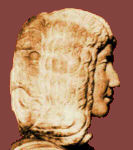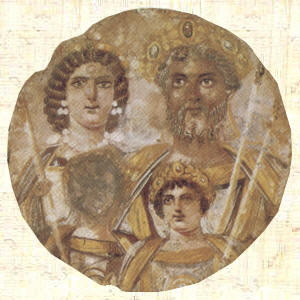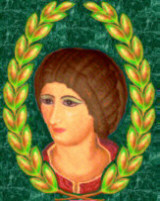I V L I A D O M N A
Philosopher-Empress of Rome


|
I entered this world at the Syrian fortress city of Emesa, just with the setting sun, on the eighth day
before the Ides of March, in that year which began the tenth in the reign of Aurelius Antoninus.
My father was Iulius Bassianus, hereditary Sacerdos of Elah-Gabal, the Apollo of our land.
This God's essence is focused, as in a lens, within a precious, extraordinary Black Stone,
peculiarly marked as it fell to the desert earth from the very heavens ages ago! Syria is
known to all as a most ancient land, and the fount of Her traditions may be as ancient as
the Gods Themselves. The stars of my birth foretold my destiny to wed a great ruler, marked by Saturn, Sun, and Mercury conjoined in the seventh house of marriage. Like unto the Moon next to it, with Mars and Venus, it would be mine to offer wise counsel at his side, during war as well as peace. Severus was posted as military commander in Syria when I was but ten, and he soon found friendship with my father. I knew, observing him even then, that fame and accomplishment were written for him. Venus and Mars coupled at his birth also, and this reflected a timeless bond between us. Severus was then married to a woman from his native Lepcis Magna, but she died while he was serving in Gaul. He sent word to my father, asking for me to come to Lugdunum and join our destinies in marriage. I am more than twenty-five years his junior, but age does not matter when the union is a fact, as Aurelius would say, ordained for us from the beginning of the world. As the Gods will, so it is done! Thus we were wed in the summer of the year VIII of Commodus. Dangerous times these were for us, when the Emperor's pandering chamberlain, Cleander, was wreaking chaos within the Army, and plots fed the strange madness of Commodus. How could the son of noble Aurelius sink to such corruption? Inevitably, Commodus was swept from the stage of power, and after seven months of turmoil, Destiny's hand brought my Severus to the Purple. We had been husband and wife for six years now, and over the course of the next eighteen, at his side I have traveled the known world, even to far Britannia, witnessed great wonders, and conversed with many paragons of ancient wisdom and vast erudition. My delight is in the study of celestial portents, philosophies, and every tessera in the mosaic of knowledge. In our far-flung journeys, I have specially endeavored to gather together the letters, accounts, and artifacts of Apollonius, the renowned Sage of Tyana, a most fascinating personage! But the sorrow of my life is the cruel jealousy which has grown unceasingly between my younger son, Geta, and Antoninus, older by eleven months. Most call him Caracallus, from his affectation of that peculiar composite cloak he's loved since campaigning in Britannia. I have pleaded with them continually to put aside the quarrel and seek a measure of harmony, even if only for my sake. Alas, they have no self-control in the matter. Painful too, for me, are the calumnies of the ambitious power-seekers who have sought favors from my illustrious husband. The worst of them is the cunning and despicable Plautianus. His daughter, another sharp thorn amid our vines, was wed to my son Antoninus, and as might be expected, the turmoil is without cease. Think not that my life is one of quiet repose! Yet, seeking the mysteries of the Cosmos does impart a measure of repose to mind and heart. How could one endure without the Timeless? You may appreciate my happiness to be away from Rome for a time, sojourning in Eboracum and Caledonia. I prefer the directness of these so-called wild peoples to the savagery of many claimants to refinement. Such, perhaps, is the irony of the destiny befalling us, whatever our station may be in this life. |

|
It was not long after the passing of Severus that Geta was killed at the hands of his
brother, much to Julia's horror. Yet, she remained a faithful counselor to her troubled surviving
son. Antoninus "Caracallus" was himself murdered on campaign against the Parthans, in Mesopotamia,
on the 8th of April, 217 CE. Though a subordinate bodyguard did the deed, it likely was instigated
by Marcus Opellius Macrinus, chief of the Praetorians. At this time, Julia Domna was in Antioch, spending her last days in the agony of breast cancer. Macrinus sought to force her into exile, but she opted for a quicker death by starvation. Macrinus shamefully tried to buy a settlement with the Parthians, at the cost of some two hundred million sestertii. He was to hold power for less than fourteen months, deposed in favor of Julia's grand-nephew, Varius Avitus, known to posterity as Elagabalus.
|
|
I offer this memorial to my namesake and time-twin...
|

|
This update recounts an unusual personal anecdote from my thirty-ninth birthday.
I've adapted it from an exchange of letters with another Romanist a few years ago: There is something so beautiful and compelling about the lore of the stars, their archetypal symbolism. I love to approach it more with the mindset of people in Antiquity, seeing the story of the gods as written in the sky: myths which contain something of value in a very compact shorthand. I am trying to learn more of the individual stars within the constellations and the attributions made to them. There is a story of my namesake Julia Domna, that the stars in her birth chart foretold her marriage to Septimius Severus and rise to handle the daily administration of the entire Empire at its height. I was able to decipher just when she was born, using a program, Home Planet, which can display the heavens at any point in time. I searched through the time around 170, and found the the salient event in Domna's chart, to which later Roman historians alluded. This particularily intriguing conjuction on the birth chart of Julia Domna is, by twist of fate, the circular destiny that brought her to the attention of Septimus Severus. It was a fairly spectacular marker of birth and linked her to her future husband. Did belief in the prognostication effectively cause the destined happening to occur? Possibly so. It appears that her birth occurred on March 8, 170, and that of Severus is well-documented as April 11, 145. I've enjoyed playing with sidereal astrology, partaking of its beautiful symbolism rather than as serious guidance. I follow the Chaldean observers in taking the true starting/ending point of the Zodiac as the star now known as eta Piscium or by the Arabic name Al-Pherg. This synchronizes the tropical and sidereal zodiacs on the vernal equinox of the year 79 C.E, a date confirmed as the starting point of India's Saka Era. On my own natal chart, the sun/moon conjunction was exact about minutes before my birth, with the star Aldebaran rising (alpha Tauri, at 13 degrees, sidereal). The larger conjuction of saturn and neptune, with the sun and moon, is in the constellation of Virgo, clustered about its alpha star, Spica. Nowadays, the astrological description given for Libra seems a lot like that offered in Roman times for Virgo, by such writers as Vettius Valens. In the reception room of the Imperial Palace, Julia and Severus are said to have the ceiling painted to depict their birth stars, but concealing the exact "stars of the hour." Their true ascendant stars were displayed on the ceiling in private quarters. They were concerned that too much openness could open them to dangers, should an enemy learn the exact birth configurations. Julia accompanied Severus on campaign to York and Scotland in early 208 C.E. Severus was to die in Britannia, three years later. My own travels in June of 1972 followed that path through York and north, into Scotland, but I had no consciousness at the time of whose path the Fates were leading me to revisit. Though I've been long drawn to Julia Domna, sensing an intuitive connection with the choice of my very name. This connection was heightened by a remarkable personal experience on October 18, 1991. I celebrated another birthday with a visit to the Walters Art Gallery in Baltimore. Upon entering one of the upper floor galleries, I saw a bright blue light shining from something in a case across the room. I was drawn to it and saw Julia Domna's signet ring, with the sun shining upon an inset aquamarine (?) stone. As I turned to view the next display, I faced a portrait bust of her and was startled to see exactly my own face looking back at me! This was a younger image, and I even wore my hair at that time with the same center parting, though with not such deep waves. It was a haunting feeling. I had hoped to acquire a coin of her issue for my collection then, but everything in a catalogue seemed frightfully costly. I did find among my own collection soon after a very worn and tarnished one depicting Concordia seated on the reverse. Upon looking very carefully at the obverse, I found that in fact it was one of Domna's. Since then I obtained two nicer denarii of her issues (with goddesses on the reverse). One, was given to me, by someone who bought it in Italy. The other is one I purchased for about $70 from a dealer in London. When I mentioned an interest in Magna Mater, they sent me that very one even at a much reduced price, quite astonishingly. This connection to Julia Domna has been but one of my links to the ancient past, though somehow 'nearer and dearer' than the rest. Mystery would have it be so.
|
|
My findings on the birth data for Domna and Severus:
IVLIA DOMNA, born 8 Mar 170 CE= VIII. ID. MAR AVC:: CMXXIII, Porrima on Ascendant in Virgo 12.85, Sun conj. Desc. in Pisces 15.78, Moon in Aries 19.55, conj. Mars & Venus in eighth house, Mercury in Pisces 27.22, Venus in Aries 10.56 conj. Hamal, Mars in Aries 14.83, Jupiter in Capricorn 10.60, Saturn conj. Desc. in Pisces 5.93. M.C. conj. Aldebaran in Taurus 11.22.
SEPTIMIVS SEVERVS, born 11 April 145 CE= III. ID. APR AVC::DCCCXCVIII, Regulus on Ascendant in Leo 2.65, Sun conj. M.C. in Aries 19.11, Moon conj. Saturn in Taurus 6.21, Mercury in Aries 1.84, Venus in Pisces 4.32 conj. Mars in Aquarius 28.86, Jupiter in Sagittarius 2.19, Saturn conj. Alcyone in Taurus 3.04, M.C. conj. Botein in Aries 23.57. Synastry: Severus' Sun & M.C. conj. Domna's Moon; Venus conj. Domna's Saturn; both have natal venus conj. mars, with mars in eighth house, a shared leaning to occult mysteries. Domna's Sun/Saturn conj. Desc. suggestive of the age and aspirations of her future husband. A*=ayanamsha, the number of degrees to be added to sidereal placements given here, to convert to tropical. The difference between sidereal and tropical is of course very small for dates in the second century C.E. The estimated birth times correspond to readings for house cusps as the focus of houses. Assuming birth times about an hour earlier will give equivalent house readings in a more familiar Placidian format.
|